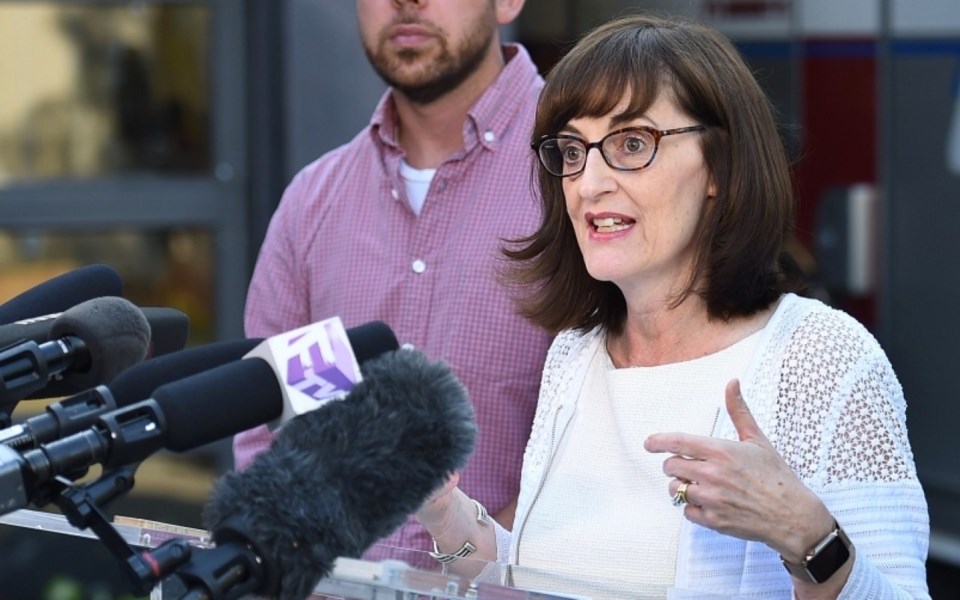As B.C.'s opioid crisis continued through 2019, the Overdose Emergency Response Centre's (OERC) leadership team changed with an executive director with mental health and addictions taking the helm.
The BC Coroners Service said Dec. 5 that October saw 69 suspected drug deaths, a 42% decrease compared with 118 deaths last October and a 21% decrease over the number of deaths in September 2019 (57).
Those last deaths represent a 58% decrease compared with the number of deaths the previous September at 135 and a 31% decrease over the number of deaths that occurred in August 2019 with 83.
Much of the work coordinating a response around the province has fallen to the OERC founded in December 2017.
The OERC has been allocated $608 million through the 2017-18 to 2021-22 provincial budget years, the Ministry of Mental Health and Addictions said.
Now, with the departure from the OERC of executive lead Dr. Patricia Daly and director Miranda Compton, Justine Patterson has taken the lead job for a two-year appointment.
Patterson is a psychologist with 15 years of clinical and leadership experience in mental health and addictions, the ministry said.
Before coming to Canada, Patterson worked in mental health and addictions in Australia.
This fulfills a recommendation for meeting a "need for clinical and operational leadership to ensure healthcare sector legitimacy," a need noted in an OERC transition report obtained by Glacier Media through access to information legislation. Glacier asked the ministry for the document directly but was told to file a request.
"Since the Overdose Emergency Response Centre (OERC) was established in December 2017, it has continued to lead the planning and coordination of our cross-government and cross-sector response to the overdose crisis," the ministry said."
"The OERC is staffed by people who have been reassigned from their regular positions as required for as long as the emergency dictates,"the ministry said. "The OERC is part of the Ministry of Mental Health and Addictions and currently has 10 full-time staff and works with partners from every part of the province who are helping save lives and connect people to treatment and recovery services."
A July report by Daly made 21 recommendations, including a regulated, legal supply of drugs, which she said is the single-most urgent of her recommendations; improving access to opioid agonist treatment; expanding programs that help prevent problematic substance use; and strengthening the system of care for people with substance-use disorder.
Daly and Compton have resumed full-time positions with Vancouver Coastal Health (VCH) where they are, respectively, chief medical health officer for VCH and director for prevention and addiction programs.
Many praised Daly and Compton for their spearheading the work.
Others weren't so happy.
Daly angered members of B.C.'s abstinence-based addiction recovery community when she suggested to Union of B.C. Municipalities delegates in September 2018 that opioid addicts use prescribed drug treatments for the rest of their lives.
"[There's] a need for lifelong treatment that will allow you to function," Daly told UBCM delegates. She said pressure to remain abstinent and the stigmatization of relapse in 12-step recovery programs may not be as effective a long-term solution such as medication.
In a Sept. 26 response to a freedom of information request asking what drug replacement therapies are approved for use, VCH said Daly has no expertise in that area.
"Dr. Daly does not make recommendations for drug treatments for opioid use disorder as this is not her area of expertise," VCH said.
The ministry said the OERC's clinical advisory group provides strategic public health and clinical guidance for it through regional response teams and the community action teams.
The transition report said the OERC works with point people in health authorities and their working groups, community action teams and organizations throughout the province. Regional health authorities confirm this.
The OERC transition report said, "We have invested in innovative approaches to the expansion of Naloxone access and drug checking."
The BC Centre for Disease Control reported Nov. 8 that "in total, 175,022 naloxone kits have been reported distributed to people who use drugs and those who are likely to witness an overdose through the BC Centre for Disease Control's (BCCDC) Take Home Naloxone program."
The money for Naloxone has not come from the OERC budget.
"The province, through BC Centre for Disease Control, has spent approximately $16.4 million on the B.C. Take Home Naloxone program between April 2016 to March 2019," the ministry said.
"The OERC, as the lead in coordinating our provincial response to the crisis, helps to ensure all partners are supported in local Take Home Naloxone program expansion efforts, the ministry said.
The ministry said communications staff for the OERC "continues to be provided by GCPE (Government Communications & Public Engagement)."
A person on secondment from VCH had been doing the communications work.
@Jhainswo
This article originally appeared here.




